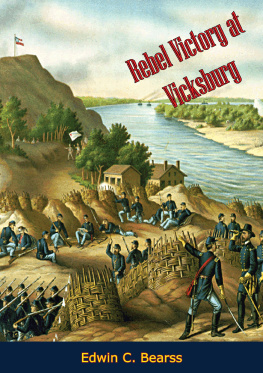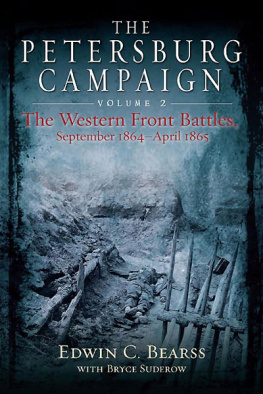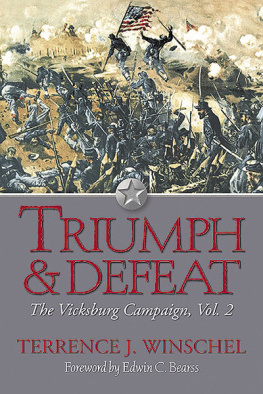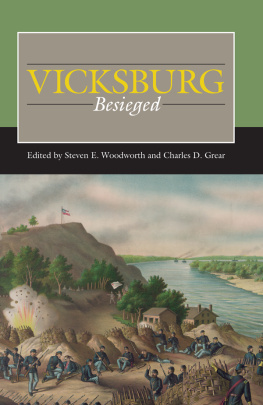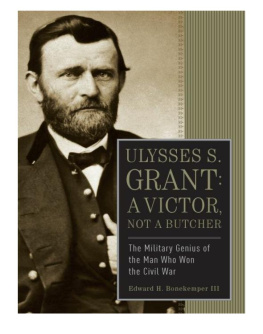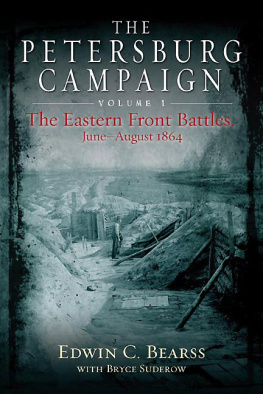Edwin C. Bearss - Rebel Victory at Vicksburg
Here you can read online Edwin C. Bearss - Rebel Victory at Vicksburg full text of the book (entire story) in english for free. Download pdf and epub, get meaning, cover and reviews about this ebook. year: 2018, publisher: Papamoa Press, genre: Adventure. Description of the work, (preface) as well as reviews are available. Best literature library LitArk.com created for fans of good reading and offers a wide selection of genres:
Romance novel
Science fiction
Adventure
Detective
Science
History
Home and family
Prose
Art
Politics
Computer
Non-fiction
Religion
Business
Children
Humor
Choose a favorite category and find really read worthwhile books. Enjoy immersion in the world of imagination, feel the emotions of the characters or learn something new for yourself, make an fascinating discovery.
- Book:Rebel Victory at Vicksburg
- Author:
- Publisher:Papamoa Press
- Genre:
- Year:2018
- Rating:3 / 5
- Favourites:Add to favourites
- Your mark:
- 60
- 1
- 2
- 3
- 4
- 5
Rebel Victory at Vicksburg: summary, description and annotation
We offer to read an annotation, description, summary or preface (depends on what the author of the book "Rebel Victory at Vicksburg" wrote himself). If you haven't found the necessary information about the book — write in the comments, we will try to find it.
Rebel Victory at Vicksburg — read online for free the complete book (whole text) full work
Below is the text of the book, divided by pages. System saving the place of the last page read, allows you to conveniently read the book "Rebel Victory at Vicksburg" online for free, without having to search again every time where you left off. Put a bookmark, and you can go to the page where you finished reading at any time.
Font size:
Interval:
Bookmark:


This edition is published by Papamoa Press www.pp-publishing.com
To join our mailing list for new titles or for issues with our books papamoapress@gmail.com
Or on Facebook
Text originally published in 1963 under the same title.
Papamoa Press 2017, all rights reserved. No part of this publication may be reproduced, stored in a retrieval system or transmitted by any means, electrical, mechanical or otherwise without the written permission of the copyright holder.
Publishers Note
Although in most cases we have retained the Authors original spelling and grammar to authentically reproduce the work of the Author and the original intent of such material, some additional notes and clarifications have been added for the modern readers benefit.
We have also made every effort to include all maps and illustrations of the original edition the limitations of formatting do not allow of including larger maps, we will upload as many of these maps as possible.
REBEL VICTORY AT VICKSBURG
by
EDWIN C. BEARSS
Contents
To my wife, family, and friends who have suffered through many years of the Civil War, I gratefully dedicate this volume .
Ed Bearss
I am deeply grateful to:
My wife, Margie Riddle Bearss, for her proofreading, criticism and help,
James W. Holland, Regional Historian for the National Park Service, Richmond, Virginia, for reading the manuscript and making comments and suggestions,
Ken Watkins of Little Rock for reading the manuscript and indexing,
Mrs. Laura Chappell of Manteo, N. C., Mrs. Eunice Simmons, Mrs. Florence Bori, Mrs. Betty Gentry, and Miss Charlie Sue Gartman of Vicksburg for typing,
The Mississippi Department of Archives and History and the Vicksburg Public Libraryespecially Miss Mary Sherard for putting up with my many requests for books from the Library of Congress,
John R. Peacock of High Point, North Carolina, for the loan of many books from his personal library,
William E. Geoghegan of the Smithsonian Institution for the answers to numerous questions regarding ship construction and nomenclature,
Captain Victor Gondos and the personnel of the National Archives for searching the files for unpublished source materials,
B. R. Adams of Shreveport, Louisiana, for drawing the maps,
The National Park Service for use of their source material and their encouragement,
Albert Banton and the personnel of the Vicksburg National Military Park for their co-operation,
And to the Mississippi Commission on the War Between the States, the Vicksburg Centennial Commemoration Association, and especially to the chairman of the Mississippi Commission on the War Between the States, Mayor John Holland of Vicksburg.
New Orleans to Baton Rouge
Port Hudson to Natchez
Coles Creek to Vicksburg
Union Advance on Vicksburg
Farragut Passes the Batteries
The Arkansas Comes Out
The importance of the Mississippi Valley, the great Heartland of North America, was readily apparent to strategists in the North and South. To protect the Mississippi Valley the Confederate high command in the late summer of 1861 established a defense line with its left flank anchored on the Mississippi at Columbus, Kentucky, its center on Bowling Green, and its right on Cumberland Gap. Two forts, Henry on the Tennessee River and Donelson on the Cumberland River, were erected and manned. The Confederate leaders hoped these two strongholds would close the two rivers to an advance by a Union amphibious force. In southwestern Missouri, a Confederate army led by Major-General Sterling Price guarded the Granby lead mines.
On the Mississippi River south of Columbus, the Confederates threw up fortifications at Island No. 10, and on the Chickasaw Bluffs north of Memphis. If the ocean-going navy should attempt to enter the mouth of the Mississippi, it would have to fight its way past Forts St. Philip and Jackson, seventy miles below New Orleans.
In May 1861, Lieutenant-General Winfield Scott began maturing plans for a movement down the Mississippi. The conquest of the great valley was already the subject of considerable discussion in the press. Finally, it was decided to strike from two directions. Plans were laid for a massive converging attack. One force (the army supported by river gunboats) would descend the Mississippi, while another task force (the deep-water navy supported by the army) would ascend the river from its mouth. Between these two forces, if all went as planned, the Confederacy would be cut in two.
At Belmont, Missouri, on November 7, 1861, occurred the first significant clash in the Union drive to wrestle control of the Mississippi Valley from the Confederates. In this battle, a force under Brigadier General Ulysses S. Grant captured the Confederate camp opposite Columbus. The timely arrival of Southern reinforcements turned the tide against the Federals. Grants troops were driven back to their transports, which carried them back to their base of operations at Cairo, Illinois. Grants attack on Belmont was designed to cover a campaign by other Union forces to drive Jeff Thompsons Confederates out of southeast Missouri. In addition, the engagement at Belmont has some significance since it was Grants first important independent command.
The Confederate force covering Cumberland Gap was routed in the Battle of Mill Springs on January 19. Following this disaster, the army charged with covering the Confederate right in the Mississippi Valley was compelled to fall back to Cumberland Gap. The next blow fell on the Confederate center. In January 1862, Major-General Henry W. Halleck (who commanded the Department of the Missouri) strongly endorsed a plan of operations that called for an amphibious thrust up the Tennessee and Cumberland rivers. Halleck pointed out that by the capture of Forts Henry and Donelson the Federals would be able to outflank the Confederate stronghold at Columbus. The large Confederate garrison would either have to evacuate or stand siege.
In consequence of this decision on Hallecks part, Grant moved up the Tennessee River. Fort Henry was captured by the navy on February 6, Grant then attacked Fort Donelson, which surrendered ten days later. The results of these great victories were quickly apparent. The Confederates were forced to evacuate Middle Tennessee, including Nashville. Hallecks opinion regarding Columbus was verified, when the Southerners also gave up that stronghold.
While Generals Albert Sidney Johnston and Pierre G. T. Beauregard strove to establish a new Confederate defense line anchored in the west on Island No. 10, they learned that the Confederate army in northwest Arkansas had been defeated at Pea Ridge. Thus, the initial Southern defense line in the west had collapsed.
Within the next several weeks a Union amphibious force (the army under Major-General John Pope, and the river gunboats commanded by Flag Officer Andrew H. Foote) closed in on Island No. 10. In the meantime, General Halleck had General Grant, now a major general, mass his army at Pittsburg Landing on the Tennessee River. There, he would await the arrival of Major-General Don Carlos Buells Army of the Ohio, which was advancing cross-country from Nashville. When Buells army reached Pittsburg Landing, the combined armies under Hallecks direction would advance and capture Corinth.
Next pageFont size:
Interval:
Bookmark:
Similar books «Rebel Victory at Vicksburg»
Look at similar books to Rebel Victory at Vicksburg. We have selected literature similar in name and meaning in the hope of providing readers with more options to find new, interesting, not yet read works.
Discussion, reviews of the book Rebel Victory at Vicksburg and just readers' own opinions. Leave your comments, write what you think about the work, its meaning or the main characters. Specify what exactly you liked and what you didn't like, and why you think so.

